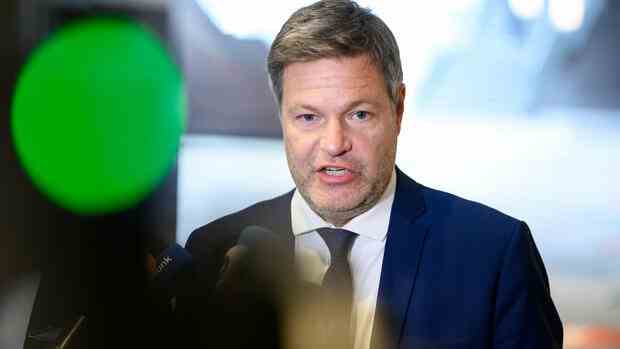With intelligent electricity meters, the grid operator can regulate online who feeds electricity into the grid or draws it from the grid and when.
(Photo: dpa)
Berlin The Federal Ministry of Economics wants to significantly accelerate the use of intelligent electricity meters. So far, smart meters are still the exception, unlike in countries like Finland, Estonia, Sweden, Italy, the Netherlands or Sweden.
The draft for a “law to restart the digitization of the energy transition” from the Ministry of Economic Affairs went to the departmental vote on Wednesday. The aim is for the law to be passed by the Bundestag in the first quarter of 2023.
Intelligent electricity meters have an important function in a changing power supply system with an ever increasing share of fluctuating electricity feed-in from renewable sources. They can help to better harmonize electricity supply and electricity demand.
With intelligent electricity meters, the grid operator can regulate online who feeds electricity into the grid or draws it from the grid and when. For example, charging processes for e-cars can be controlled in such a way that they preferably take place in times of high electricity feed-in from renewable sources. In view of the increase in electricity-powered applications – for example for heating buildings with electric heat pumps – the fields of application of the devices are becoming ever larger.
Top jobs of the day
Find the best jobs now and
be notified by email.
They can help individual consumers to shift their consumption to times when electricity prices are low. They serve the overall system because they help to make better use of the power grids.
Bureaucratic hurdles in Germany
But in Germany, their use has so far faced high hurdles. Previously, a device could only be approved for use by the Federal Office for Information Security (BSI) if it had all the minimum functionalities required by law at that point in time, including complex functions such as the remote control of systems and consumer devices. A gradual market launch with subsequent application updates, however, was not planned until now.
That will now be changed. The law allows an “agile rollout”. In a ramp-up phase limited in time, functions may be gradually introduced via updates.
The Measuring Point Operation Act, which came into force in 2016, also stipulates that devices may only be certified if certification from three independent manufacturers has been obtained for a specific development stage. This rule should be dropped. In the future, the pace should be determined solely by the most innovative manufacturer, so it is no longer necessary to wait until at least three manufacturers have reached a technical tie.
Smart meters help to better harmonize electricity supply and electricity demand.
(Photo: dpa)
In order to make the possible applications of intelligent meters economically attractive, dynamic electricity tariffs should become the standard. Currently, only electricity suppliers who supply more than 100,000 electricity consumers have to offer their customers a dynamic electricity tariff with an intelligent metering system.
According to the draft law, from 2026 all electricity suppliers should offer dynamic tariffs, regardless of the number of their customers, so that consumers can shift their electricity purchases to cheaper times when there is a high feed-in of renewable energy.
Industry welcomes the bill
The Association for Electrical Engineering, Electronics and Information Technology (VDE) welcomes the draft law. Politicians have recognized “how urgent the rollout of intelligent measuring systems is”. It is positive that the draft law provides for simplifications in administrative and delivery processes, so that the rollout can be accelerated.
In addition, the use of anonymous consumer data is simplified for the network operators, so that the control of the networks can be improved. However, the VDE criticizes that the flexibility in the electricity distribution network has not yet found its way into the draft of the Federal Ministry of Economics.
“For secure and stable network operation, it is necessary for network operators to be able to carry out control and switching actions via the intelligent measuring system. This role of the grid operator must be clearly anchored in the law,” demands the VDE.
The planned law does not regulate the question of whether and to what extent electricity network operators can introduce forced charging breaks for e-cars in order to smooth consumption peaks and prevent network overloads. The Federal Network Agency is currently carrying out a determination procedure on this topic. Associations and other representatives of the affected sectors can contribute their ideas until the end of January next year.
More: This is how the construction of the LNG terminals is progressing
